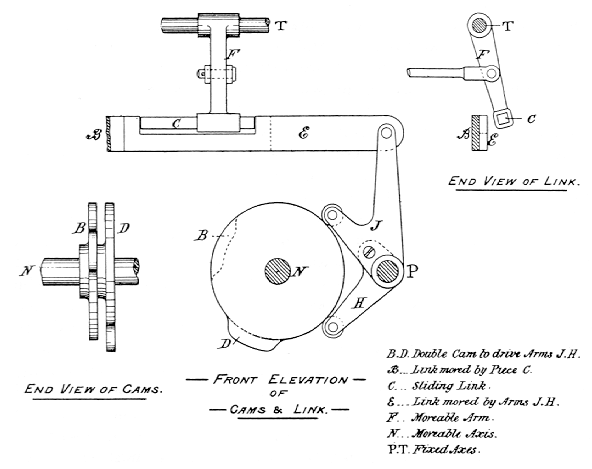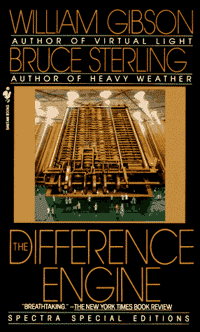
Hey! An unexpected data dump of Charles Babbage related links, thanks to Bruce Sterling's blog at Wired:
Charles Babbage speculates up a series of tubes!
Bruce Sterling reads through some descriptions of the proposed capabilities of the Analytical Engine and equates them to their current computing analogues:
Now it may happen in addition that two or more numbers being added together, there may not be room at the top of the column for the left hand figure of the result. This would usually happen from an oversight in preparing or arranging the cards when space should be left; but it might so happen that the calculation led, as mathematical problems sometimes do, through infinity. In either case a bell would be rung and the engine stopped (((bug)))
This principle of “Chain” is used also to govern the engine in those cases where the mathematician himself is not able to say beforehand what may happen, and what course is to be pursued, but has to let it depend on the intermediate result of the calculation arrived at. (((generative art))) He may wish to shape it in different ways according as one or several events may occur, and “Chain” gives him the power to do it mechanically. By this contrivance machines to play simple games of skill such as “tit tat too” have been designed. (((computer games)))
He then points out this great glossary explaining what components of the Analytical Engine equate to what components of a modern computer, which is one page of John Walker's great accumulation of historical documents about the Analytical Engine, some by Charles Babbage's son.
Quite a lot of background reading here to prepare for the novel!
- Bill




I have sort of a side-question about where the contemporary use of the word "maker" came from. Bruce uses it to describe Babbage in your second link: "It’s odd how maker-like Babbage’s attitude is: he’s a geek first and an industrialist second."
ReplyDeleteI'd guess it's come about in the last three years or so due to Make Magazine and Etsy and the resurgence of craft. The reason I'm piqued is because I just read an Orson Scott Card short story from 1980, Unaccompanied Sonata, wherein a Maker is someone chosen in infancy to have prodigious creative talent (in a society where everyone is sorted early by aptitude tests). I just wondered if this story - or the many I'm sure use a similar phrasing - had any influence on the modern term. And if it has a longer history than I'm aware of.
I think it's use comes from Make Magazine mainly. I don't think it's derived from the use Orson Scott Card puts it to.
ReplyDeleteCard actually has a series of books that began in 1987 and is still underway which are collectively called the The Tales of Alvin Maker. In this usage the word Maker refers to a kind of magician. The books are set in an alternate reality Americas where Native Americans had real magic and weren't fully conquered, the Northern and Southern States in the US became two different countries, Napoleon conquered the Louisiana territory, etc. - Alvin's story sort of follows the story of John Smith in Mormon myth.
If there were any Orson Scott Card use of the word "Maker" that would have been picked up in the wider culture, it would have been the one from these books, which were quite popular for a time.
I really think the current use of the word to define a resurgent culture of amateur crafters and electronics tinkerers is a very recent coinage and isn't even widely known in the mainstream culture.
Excellent. Good to know.
ReplyDelete(You know, we have quite a few possible follow-ups if this experiment goes well - this series you mention, plus Moorcock's "influential steampunk"/"alternative history" trilogy. Just throwing that out there.)
(Yes, I've been thinking it might be interesting to continue this exercise in dual-blog-reading past this book as well... though I don't know if I'm up for Card. I read the first couple of those Alvin Maker books, and they were fun, but as it went on it got a bit tedious and heavy handed. Card is also kind of a vocal religious opponent of homosexuality in real life, and although that doesn't actually bleed into his fiction much, at least not the books I've read, just having read some of his anti-gay essays has put me off actually reading any more of his books.
ReplyDeleteThere are many other books that we might read here. I read those Moorcock books years ago, but don't remember them well and would be up for a re-read. There is Neal Stephenson's tremendous Baroque Cycle that I'd also be up for re-reading. If we're getting into things I haven't read before, some books that stray from the Steampunk genre but fit the theme as difficult books to read are Wallace's Infinite Jest, which I got about 100 pages into and then died, or any book by Thomas Pynchon. I've never read any Delilo. There are many books.
We should circle back to this near the end of the month!)